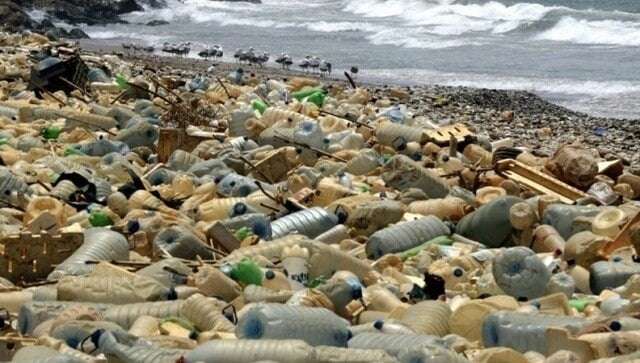The landmark resolution addresses the full lifecycle of plastic, including its production, design and disposal. The resolution calls for immediate collective voluntary action by countries towards the goal of ending plastic pollution
In a historic move to deal with the global problem of plastic waste, 175 nations across the world adopted a historic resolution at the fifth United Nations Environment Assembly (UNEA) in Nairobi to forge an international "legally binding agreement” by 2024 to end plastic pollution.
The landmark resolution addresses the full lifecycle of plastic, including its production, design and disposal.
A standing ovation from #UNEA5 delegates after the resolution on plastic pollution passes. "The most important environmental deal since the Paris accord." - @andersen_inger #BeatPlasticPollution pic.twitter.com/zpsgVliraZ — UN Environment Programme (@UNEP) March 2, 2022
The resolution calls for immediate collective voluntary action by countries towards the goal of ending plastic pollution.
Let’s take a look at what does the resolution mean and why it is the need of the hour:
Scale of the plastic pollution problem
President of the Assembly and Norway’s Minister for Climate and the Environment, Espen Barth Eide said, “Plastic pollution has grown into an epidemic. With today’s resolution we are officially on track for a cure.”
According to the United Nations Environment Programme (UNEP), plastic pollution amounted for two million tonnes in 1950, which increased to 348 million tonnes in 2017, becoming a global industry valued at $522.6 billion.
It is expected to double in capacity by 2040.
The UN agency said that plastic production and pollution add to the “triple planetary crisis” of climate change, nature loss and pollution.
Exposure to plastics harms human health and potentially affects fertility, hormonal, metabolic and neurological activity, while open burning of plastic contributes to air pollution.
The agency said that by 2050, greenhouse gas emissions associated with plastics would account for 15 per cent of allowed emissions, under the goal of limiting global warming to 1.5°C (34.7°F) in line with the Paris Agreement on climate change.
More than 800 marine and coastal species are affected by this pollution through ingestion, entanglement, and other dangers, while around 11 million tonnes of plastic waste flow each year into the ocean. This could triple by 2040, the UNEP said.
The resolution, based on three initial draft resolutions from various nations, including Japan, Peru and Rwanda, establishes an Intergovernmental Negotiating Committee (INC) which will begin its work this year, aiming to complete a draft legally binding agreement by the end of 2024.
The legally binding agreement would reflect diverse alternatives to address the full lifecycle of plastics, the design of reusable and recyclable products and materials, and the need for enhanced international collaboration to facilitate access to technology, to allow the revolutionary plan to be realised.
Today's adoption by 175 countries of a landmark resolution to #BeatPlasticPollution is a major step forward in our efforts to make peace with nature. This is the most important environmental deal since the #ParisAgreement.https://t.co/7tCqcxdNji — António Guterres (@antonioguterres) March 3, 2022
The UNEP said that it would convene a forum by the end of 2022 in conjunction with the first session of the INC, to share knowledge and best practices in different parts of the world.
“Today marks a triumph by planet earth over single-use plastics. This is the most significant environmental multilateral deal since the Paris accord. It is an insurance policy for this generation and future ones, so they may live with plastic and not be doomed by it.” said Inger Andersen, Executive Director of UNEP.
Andersen added that the UNEP will work with any willing government and business to shift away from single-use plastics.
“...as well as to mobilise private finance and remove barriers to investments in research and in a new circular economy,” she said.
A shift to a circular economy can reduce the volume of plastics entering oceans by over 80 per cent by 2040; reduce virgin plastic production by 55 per cent; save governments $70 billion by 2040; reduce greenhouse gas emissions by 25 per cent; and create 700,000 additional jobs – mainly in the global south.
A circular economy is a model of production and consumption, which involves sharing, leasing, reusing, repairing, refurbishing and recycling existing materials and products as long as possible. The model aims to tackle global issues of climate change, waste management, biodiversity loss and pollution.
Once approved in 2024, the global plastic treaty will be among the likes of the Montreal Protocol and the Paris Climate Agreement as one of the most important international laws towards addressing climate change.
Read all the Latest News, Trending News, Cricket News, Bollywood News,
India News and Entertainment News here. Follow us on Facebook, Twitter and Instagram.

N0SF3RATU on March 5th, 2022 at 14:23 UTC »
Action speaks louder than words. UN doesn't take action - in fact they're putting off even discussing action until 2024 (per the article).
Title rework:
"UN plans to hold talks about the impact of plastic pollution in 2024."
atomicskier76 on March 5th, 2022 at 13:34 UTC »
Over half of all plastic ever produced has been produced in the last two decades.
kalevetklep on March 5th, 2022 at 12:23 UTC »
Someone hasn’t been paying attention in physics class.